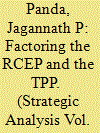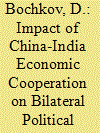|
|
|
Sort Order |
|
|
|
Items / Page
|
|
|
|
|
|
|
| Srl | Item |
| 1 |
ID:
127468


|
|
|
|
|
| Publication |
2014.
|
| Summary/Abstract |
The Regional Comprehensive Economic Partnership (RCEP) and the Trans-Pacific Partnership (TPP) are not necessarily two contending trade liberalising models, but their import and arrival have posed stiff political challenges for many countries, including China and India, Asia's two heavyweights. With these two initiatives, the regional trade of Asia is entering an interesting phase of liberalisation and integration. In fact, it is gradually becoming clear that the facets and nuances attached to these two trade liberalisation models will impact regional power politics massively in times to come. While the success of TPP hinges on the global economic authority of the US and how the negotiation process unfolds, the future dynamism of RCEP will depend heavily on how China and the Association of South-East Asian Nations (ASEAN) conduct their negotiation process and accommodate the interests of other regional powers, including India. Hitherto, it has been no secret that both RCEP and TPP will greatly affect and influence ASEAN and the role of its free trade agreement (FTA) partner countries, including China and India. In this regional stratagem, China-India relations may witness new dynamics and power politics in East Asia or in the broader Asia-Pacific region. It may also open a new window of opportunity for India's greater integration with the East Asia region. India needs to analyse carefully the efficacy and implications of both RCEP and TPP to see how far they serve New Delhi's own regional interests. RCEP may eventually facilitate India's 'Look East' policy more effectively than TPP. The former allows New Delhi to coordinate with ASEAN+6 countries more effectively, to which China has so far been fundamentally opposed.
|
|
|
|
|
|
|
|
|
|
|
|
|
|
|
|
| 2 |
ID:
151064


|
|
|
|
|
| Summary/Abstract |
Sitting strategically astride one of the busiest and most critical shipping lanes of the world, there is no place better than Galle in Sri Lanka, to brainstorm about the Oceans. There was a time when oceans were deemed barriers between land masses. That paradigm has shifted to view oceans as connectors of land masses. This has been made possible by maritime transportation offering economies of scale that far surpasses what is possible on continent; an edge that has only grown with passage of time.
|
|
|
|
|
|
|
|
|
|
|
|
|
|
|
|
| 3 |
ID:
155096


|
|
|
|
|
| Summary/Abstract |
Of the recent transformations in the political economy of the Asia-Pacific, one of the most dramatic has been to the region's trade architecture. For many years, Asian government were committed trade multilateralists: pursuing liberalisation either globally through the GATT, or regionally via APEC's model of open regionalism. Underpinned by US and Japanese leadership, this system provided the foundation for the export-driven Asian economic miracle. But since the early twenty-first century, the system has been rapidly transformed. The proliferation of preferential trade agreements has threatened to undermine the cohesiveness of regional trade arrangements. The emergence of WTO-Plus style liberalisation, emphasising services, investment and intellectual property, marks the maturation of a system previously focussed on tariff reduction and manufacturing exports. Since 2011, competition between two ‘mega-regional’ proposals – the Trans-Pacific Partnership and the Regional Comprehensive Economic Partnership – is also indicative of new splits which cut across traditional developmental divides. Growing geopolitical rivalry between the US and China has also raised question of who will lead the next round of liberalisation in the region. Exploring these new trends, this paper argues the trade architecture of the Asia-Pacific is entering is becoming more contested and fragmented, with major implications for economic regionalism in coming years.
|
|
|
|
|
|
|
|
|
|
|
|
|
|
|
|
| 4 |
ID:
192462


|
|
|
|
|
| Summary/Abstract |
RELATIONS between China and India are affected by a combination of economic and political factors. On one hand, trade between the two countries is marked by positive dynamics, and they interact successfully on issues of global development and multilateral international cooperation. On the other hand, they are military and political rivals and compete for regional economic leadership. Former Indian national security adviser Shivshankar Menon considers Indian-Chinese relations a combination of cooperation and rivalry.
|
|
|
|
|
|
|
|
|
|
|
|
|
|
|
|
|
|
|
|
|